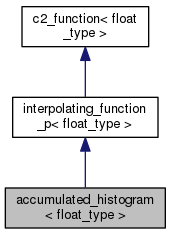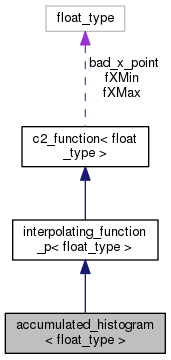|
Geant4
10.03.p03
|
|
Geant4
10.03.p03
|
An interpolating_function_p which is the cumulative integral of a histogram.Note than binedges should be one element longer than binheights, since the lower & upper edges are specified. Note that this is a malformed spline, since the second derivatives are all zero, so it has less continuity. Also, note that the bin edges can be given in backwards order to generate the reversed accumulation (starting at the high end) More...
#include <c2_function.hh>


Public Member Functions | |
| accumulated_histogram (const std::vector< float_type >binedges, const std::vector< float_type > binheights, bool normalize=false, bool inverse_function=false, bool drop_zeros=true) | |
| Construct the integrated histogram. More... | |
 Public Member Functions inherited from interpolating_function_p< float_type > Public Member Functions inherited from interpolating_function_p< float_type > | |
| interpolating_function_p () | |
| an empty linear-linear cubic-spline interpolating_function_p More... | |
| interpolating_function_p (const c2_function_transformation< float_type > &transform) | |
| an empty cubic-spline interpolating_function_p with a specific transform More... | |
| interpolating_function_p < float_type > & | load (const std::vector< float_type > &x, const std::vector< float_type > &f, bool lowerSlopeNatural, float_type lowerSlope, bool upperSlopeNatural, float_type upperSlope, bool splined=true) |
| do the dirty work of constructing the spline from a function. More... | |
| interpolating_function_p < float_type > & | load_pairs (std::vector< std::pair< float_type, float_type > > &data, bool lowerSlopeNatural, float_type lowerSlope, bool upperSlopeNatural, float_type upperSlope, bool splined=true) |
| do the dirty work of constructing the spline from a function. More... | |
| interpolating_function_p < float_type > & | sample_function (const c2_function< float_type > &func, float_type amin, float_type amax, float_type abs_tol, float_type rel_tol, bool lowerSlopeNatural, float_type lowerSlope, bool upperSlopeNatural, float_type upperSlope) |
| do the dirty work of constructing the spline from a function. More... | |
| interpolating_function_p < float_type > & | load_random_generator_function (const std::vector< float_type > &bincenters, const c2_function< float_type > &binheights) |
| initialize from a grid of points and a c2_function (un-normalized) to an interpolator which, when evaluated with a uniform random variate on [0,1] returns random numbers distributed as the input function. More... | |
| interpolating_function_p < float_type > & | load_random_generator_bins (const std::vector< float_type > &bins, const std::vector< float_type > &binheights, bool splined=true) |
| virtual float_type | value_with_derivatives (float_type x, float_type *yprime, float_type *yprime2) const |
| get the value and derivatives. More... | |
| virtual | ~interpolating_function_p () |
| destructor More... | |
| virtual interpolating_function_p < float_type > & | clone () const |
| void | get_data (std::vector< float_type > &xvals, std::vector< float_type > &yvals) const |
| void | get_internal_data (std::vector< float_type > &xvals, std::vector< float_type > &yvals, std::vector< float_type > &y2vals) const |
| void | set_lower_extrapolation (float_type bound) |
| void | set_upper_extrapolation (float_type bound) |
| interpolating_function_p < float_type > & | unary_operator (const c2_function< float_type > &source) const |
| interpolating_function_p < float_type > & | binary_operator (const c2_function< float_type > &rhs, const c2_binary_function< float_type > *combining_stub) const |
| interpolating_function_p < float_type > & | add_pointwise (const c2_function< float_type > &rhs) const |
| interpolating_function_p < float_type > & | subtract_pointwise (const c2_function< float_type > &rhs) const |
| interpolating_function_p < float_type > & | multiply_pointwise (const c2_function< float_type > &rhs) const |
| interpolating_function_p < float_type > & | divide_pointwise (const c2_function< float_type > &rhs) const |
| void | clone_data (const interpolating_function_p< float_type > &rhs) |
 Public Member Functions inherited from c2_function< float_type > Public Member Functions inherited from c2_function< float_type > | |
| const std::string | cvs_header_vers () const |
| get versioning information for the header file More... | |
| const std::string | cvs_file_vers () const |
| get versioning information for the source file More... | |
| virtual | ~c2_function () |
| destructor More... | |
| float_type | operator() (float_type x) const |
| evaluate the function in the classic way, ignoring derivatives. More... | |
| float_type | operator() (float_type x, float_type *yprime, float_type *yprime2) const |
| get the value and derivatives. More... | |
| float_type | find_root (float_type lower_bracket, float_type upper_bracket, float_type start, float_type value, int *error=0, float_type *final_yprime=0, float_type *final_yprime2=0) const |
| solve f(x)==value very efficiently, with explicit knowledge of derivatives of the function More... | |
| float_type | partial_integrals (std::vector< float_type > xgrid, std::vector< float_type > *partials=0, float_type abs_tol=1e-12, float_type rel_tol=1e-12, int derivs=2, bool adapt=true, bool extrapolate=true) const |
| float_type | integral (float_type amin, float_type amax, std::vector< float_type > *partials=0, float_type abs_tol=1e-12, float_type rel_tol=1e-12, int derivs=2, bool adapt=true, bool extrapolate=true) const |
| a fully-automated integrator which uses the information provided by the get_sampling_grid() function to figure out what to do. More... | |
| c2_piecewise_function_p < float_type > * | adaptively_sample (float_type amin, float_type amax, float_type abs_tol=1e-12, float_type rel_tol=1e-12, int derivs=2, std::vector< float_type > *xvals=0, std::vector< float_type > *yvals=0) const |
| create a c2_piecewise_function_p from c2_connector_function_p segments which is a representation of the parent function to the specified accuracy, but maybe much cheaper to evaluate More... | |
| float_type | xmin () const |
| float_type | xmax () const |
| void | set_domain (float_type amin, float_type amax) |
| size_t | get_evaluations () const |
| void | reset_evaluations () const |
| reset the counter More... | |
| void | increment_evaluations () const |
| count evaluations More... | |
| bool | check_monotonicity (const std::vector< float_type > &data, const char message[]) const |
| check that a vector is monotonic, throw an exception if not, and return a flag if it is reversed More... | |
| virtual void | set_sampling_grid (const std::vector< float_type > &grid) |
| establish a grid of 'interesting' points on the function. More... | |
| std::vector< float_type > * | get_sampling_grid_pointer () const |
| get the sampling grid, which may be a null pointer More... | |
| virtual void | get_sampling_grid (float_type amin, float_type amax, std::vector< float_type > &grid) const |
| void | preen_sampling_grid (std::vector< float_type > *result) const |
| The grid is modified in place. More... | |
| void | refine_sampling_grid (std::vector< float_type > &grid, size_t refinement) const |
| c2_function< float_type > & | normalized_function (float_type amin, float_type amax, float_type norm=1.0) const |
| create a new c2_function from this one which is normalized on the interval More... | |
| c2_function< float_type > & | square_normalized_function (float_type amin, float_type amax, float_type norm=1.0) const |
| c2_function< float_type > & | square_normalized_function (float_type amin, float_type amax, const c2_function< float_type > &weight, float_type norm=1.0) const |
| create a new c2_function from this one which is square-normalized with the provided weight on the interval More... | |
| c2_sum_p< float_type > & | operator+ (const c2_function< float_type > &rhs) const |
| factory function to create a c2_sum_p from a regular algebraic expression. More... | |
| c2_diff_p< float_type > & | operator- (const c2_function< float_type > &rhs) const |
| factory function to create a c2_diff_p from a regular algebraic expression. More... | |
| c2_product_p< float_type > & | operator* (const c2_function< float_type > &rhs) const |
| factory function to create a c2_product_p from a regular algebraic expression. More... | |
| c2_ratio_p< float_type > & | operator/ (const c2_function< float_type > &rhs) const |
| c2_composed_function_p < float_type > & | operator() (const c2_function< float_type > &inner) const |
| compose this function outside another. More... | |
| float_type | get_trouble_point () const |
| Find out where a calculation ran into trouble, if it got a nan. If the most recent computation did not return a nan, this is undefined. More... | |
| void | claim_ownership () const |
| increment our reference count. Destruction is only legal if the count is zero. More... | |
| size_t | release_ownership_for_return () const |
| decrement our reference count. Do not destroy at zero. More... | |
| void | release_ownership () const |
| size_t | count_owners () const |
| get the reference count, mostly for debugging More... | |
| void | fill_fblock (c2_fblock< float_type > &fb) const |
| fill in a c2_fblock<float_type>... a shortcut for the integrator & sampler More... | |
Additional Inherited Members | |
 Public Attributes inherited from interpolating_function_p< float_type > Public Attributes inherited from interpolating_function_p< float_type > | |
| const c2_function_transformation < float_type > & | fTransform |
 Protected Member Functions inherited from interpolating_function_p< float_type > Protected Member Functions inherited from interpolating_function_p< float_type > | |
| void | spline (bool lowerSlopeNatural, float_type lowerSlope, bool upperSlopeNatural, float_type upperSlope) |
| create the spline coefficients More... | |
 Protected Member Functions inherited from c2_function< float_type > Protected Member Functions inherited from c2_function< float_type > | |
| c2_function (const c2_function< float_type > &src) | |
| c2_function () | |
| virtual void | set_sampling_grid_pointer (std::vector< float_type > &grid) |
 Static Protected Member Functions inherited from interpolating_function_p< float_type > Static Protected Member Functions inherited from interpolating_function_p< float_type > | |
| static bool | comp_pair (std::pair< float_type, float_type > const &i, std::pair< float_type, float_type > const &j) |
 Protected Attributes inherited from interpolating_function_p< float_type > Protected Attributes inherited from interpolating_function_p< float_type > | |
| std::vector< float_type > | Xraw |
| std::vector< float_type > | X |
| std::vector< float_type > | F |
| std::vector< float_type > | y2 |
| c2_const_ptr< float_type > | sampler_function |
| bool | xInverted |
| size_t | lastKLow |
 Protected Attributes inherited from c2_function< float_type > Protected Attributes inherited from c2_function< float_type > | |
| std::vector< float_type > * | sampling_grid |
| bool | no_overwrite_grid |
| float_type | fXMin |
| float_type | fXMax |
| size_t | evaluations |
| float_type | bad_x_point |
| this point may be used to record where a calculation ran into trouble More... | |
An interpolating_function_p which is the cumulative integral of a histogram.
Note than binedges should be one element longer than binheights, since the lower & upper edges are specified. Note that this is a malformed spline, since the second derivatives are all zero, so it has less continuity. Also, note that the bin edges can be given in backwards order to generate the reversed accumulation (starting at the high end)
Definition at line 2173 of file c2_function.hh.
| accumulated_histogram< float_type >::accumulated_histogram | ( | const std::vector< float_type > | binedges, |
| const std::vector< float_type > | binheights, | ||
| bool | normalize = false, |
||
| bool | inverse_function = false, |
||
| bool | drop_zeros = true |
||
| ) |
Construct the integrated histogram.
| binedges | the edges of the bins in binheights. It should have one more element than binheights |
| binheights | the number of counts in each bin. |
| normalize | if true, normalize integral to 1 |
| inverse_function | if true, drop zero channels, and return inverse function for random generation |
| drop_zeros | eliminate null bins before integrating, so integral is strictly monotonic. |